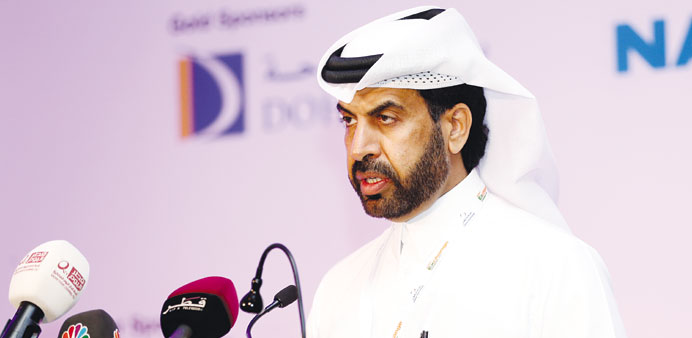By Santhosh V Perumal/Business Reporter
The Qatar Exchange’s (QE) upgrade to emerging market by both MSCI and Standard & Poor’s Dow Jones is likely to see as much as QR3bn foreign funds inflow and reflects global investment institutions’ growing confidence in the bourse, its top official said yesterday.
“These upgrades are a very positive step for the development of the QE and are likely to enhance the trustworthiness of the market and consequently attract foreign portfolios, estimated to worth QR3bn,” QE chief executive Rashid bin Ali al-Mansoori told the 9th World Exchange Congress (WEC).
The upgrade of Qatar’s status reflects meeting the qualitative requirements for inclusion in emerging markets, especially the degree of openness of the market to the international investors and an established and well-tested operational framework, he said.
Both MSCI and S&P Dow Jones had decided to upgrade the QE into emerging market from the frontier status, effective from June and September this year respectively.
“The QE has witnessed many achievements that have contributed to the strengthening of its role as a regional financial centre, especially after the MSCI upgrading of the Qatari market into emerging market status,” HE the Finance Minister Ali Sherif al-Emadi said.
The 2012 law, giving the Qatar Central Bank the supreme authority in the supervision of all financial services and markets, is an important step in promoting financial stability, he said, adding the role of the government is to ensure a regulatory environment and policies that are needed to encourage investment environment.
The upgrade “clearly and evidently” reflects the recognition of global investment institutions due to the positive steps taken by the QE, in terms of the market infrastructure development and the implementation of several initiatives, according to al-Mansoori.
On foreign investments, he said the QE will continue to provide the best practices for attracting overseas investors, especially by improving liquidity and expanding membership base and custodians. It will facilitate listing procedures and developing investment products and improving disclosure and transparency.
“The liquidity is very important factor in the financial markets because low liquidity will result in a negative impact on all investors, especially international ones,” he said.
Addressing one of the panel meetings, Mohsin Mujtaba Rizvi, product and market development director, QE, said liquidity was the key area as it concerns all stakeholders such as issuers, intermediaries and investors.
The QE has achieved significant progress and made remarkable achievements at the legislative and technical levels, awareness-raising and spreading the culture of investment and the diversification of investment tools and services provided to investors, al-Mansoori said.
“The keenness to develop the QE is attributed to the fact that the stock market plays a pivotal role in achieving economic and financial development through developing listed companies and providing public investors with investment opportunities,” he said.
The QE, which has become the link between listed companies and individual investors in the savings-investment chain, has already launched new investment tools such as bonds and treasury bills as well as new indices, created venture market for small and medium enterprises and allowed banks to undertake brokerage services, he added.

